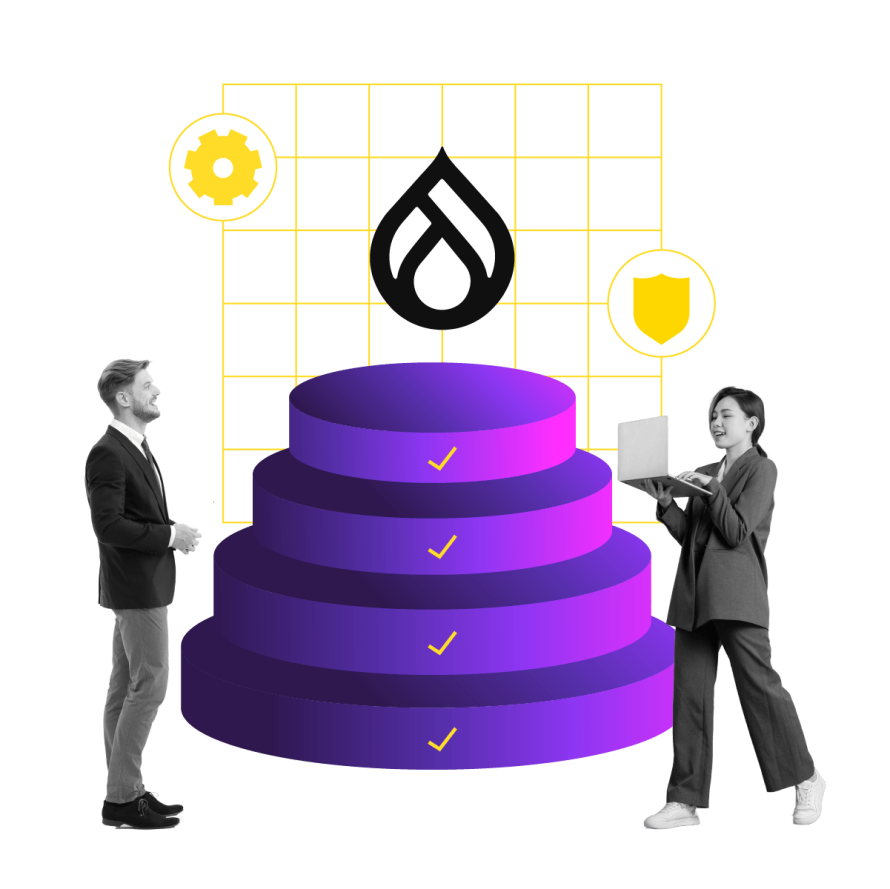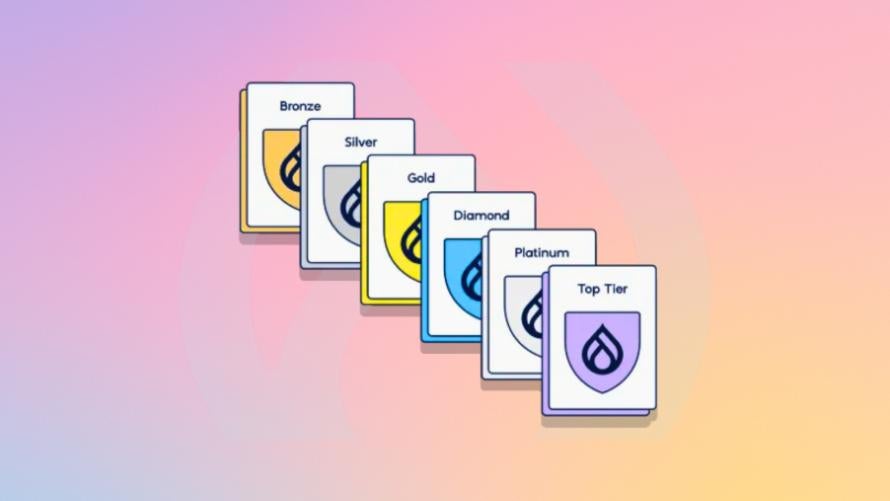Evaluating Drupal Partners: Key Certification Factors
Image

Choosing the right agency partner to support your enterprise project in Drupal is a big decision. While Drupal makes up just 1.2% of the global CMS market, it powers some of the most complex, high-traffic websites worldwide. From government agencies to major brands, many organizations choose Drupal because of its flexibility, security and scalability. It takes serious skills to really make the most of Drupal's power. Plenty of agencies claim to be “Drupal experts,” yet few have the proven experience, community involvement and technical rigor to deliver at scale. Certification isn’t just a sticker on a site – it’s a mark of genuine commitment and skill within the Drupal ecosystem.
Knowing what to look for in a certified partner helps you reduce risk and make sure your project is successful from day one.
Choosing the right Drupal agency partner for your project
Start with certification, but go deeper.
Certification shows a partner’s commitment to Drupal and staying current, but it’s just the starting point. Dig into their real-world experience – have they solved challenges like securing high-traffic sites, complex integrations, or scaling during surges?
Look for proven success stories.
Find data-backed examples like the Doctors Without Borders site rebuild with Blue State and Pantheon. Their collaboration delivered real performance gains and donor engagement under pressure.
Review recent project experience.
Check how many Drupal projects they’ve completed and whether they use current versions and best practices. Industry experience can also help them anticipate compliance and complexity needs.
Evaluate team strength.
How many certified Drupal developers are on staff? Do they contribute to the Drupal community? A stable, active team minimizes risk of delays or handoff issues.
Assess their collaboration process.
Partners who deeply understand your goals and explore opportunities beyond scope are more valuable long-term. Make sure their project management style fits how you work.
Verify reliability.
Ask for references from similar projects and confirm the level of post-launch support, especially for complex custom work.
Inside the Drupal Partner Program
The Drupal Certified Partner Program recognizes agencies that actively contribute to the Drupal project and community while delivering high-quality Drupal solutions. It’s built around the principle that the health and future of Drupal depend on agencies that not only build great sites but also give back through code, community involvement and financial support.
Image

Certification is tiered, reflecting the level of annual contribution an agency makes. These tiers range from Bronze and Silver, up to Gold, Platinum, Diamond and the exclusive Top Tier. Each tier requires a minimum number of contribution credits, which weigh things like code commits, case studies and community participation, as well as a corresponding financial sponsorship that supports Drupal’s ongoing development and sustainability. To qualify for the program, agencies must have at least 150 contribution credits on Drupal.org – currently the only explicit eligibility requirement in the application process.
Being a certified partner offers tangible benefits. Agencies gain visibility in the official Drupal Certified Partner marketplace, enhancing their credibility and helping potential clients find trusted experts. Partners receive official badges for marketing, access to exclusive promotional materials and quarterly leadership webinars hosted by the Drupal Association. These perks help agencies stand out and grow their business.
The program also unlocks unique networking opportunities, especially around DrupalCon and other community events. Certified partners get special sponsorship discounts, early access to event sponsorships and invitations to exclusive gatherings where they can connect with fellow innovators shaping Drupal’s future.
Ultimately, the program rewards those agencies that balance “making” with “taking.”
Community involvement: The difference between "makers" and "takers"
In the Drupal ecosystem, not all partners contribute equally. The community distinguishes between “makers” – those who actively invest time, code and resources to improve Drupal and “takers” – those who primarily use Drupal without giving back. This distinction matters deeply for enterprise projects that rely on a partner’s long-term commitment to the platform’s health and innovation.
“Makers” help keep Drupal secure, flexible and evolving. They contribute code, fix bugs, write documentation, organize events and financially support the Drupal Association. These partners make sure Drupal stays competitive and sustainable. In fact, a small group of contributors creates the majority of Drupal’s value, with many top contributors coming from surprisingly small organizations. The Drupal Certified Partner Program now emphasizes rewarding these “makers” by requiring minimum contribution levels and financial sponsorship aligned with company size.
On the other hand, “takers” benefit from the work of makers without contributing enough themselves. While some may lack resources or awareness, many have the means but choose not to participate. This imbalance risks slowing innovation and shifting the burden onto a shrinking group of makers.
Ultimately, supporting makers is critical not just for the health of Drupal but for the success and security of your own projects.
How to ensure a smooth collaboration with your Drupal partner
- Agree on communication channels: Establish how you’ll communicate from the start, whether it’s through email, chat or project management tools.
- Set regular check-ins: Establish a rhythm for ongoing updates to ensure both teams stay aligned.
- Define the project scope and timelines: Clearly outline the scope of work, deadlines and success metrics in writing to prevent misunderstandings.
- Align on development and production environments: Make sure both teams are on the same page about how environments will be used to avoid surprises later on.
- Set up a structured approval process: Define how key milestones and deliverables will be reviewed and approved throughout the project.
- Document and version code properly: Decide on how code will be documented, versioned and handed off between teams for smooth transitions.
- Manage change requests proactively: Discuss how changes will be handled, both in terms of process and cost, to avoid delays and friction later.
- Build mutual respect and trust: Leverage each other's expertise – your deep knowledge of business goals and their technical expertise – for a stronger partnership.
How Pantheon optimizes your Drupal site
Pantheon is the leading WebOps Drupal platform provider and is proud to be a gold Drupal partner. Our partnership reflects how Drupal partners include not only development agencies but also technology and platform providers collaborating to deliver comprehensive Drupal solutions.
Pantheon’s infrastructure is purpose-built for Drupal, combining Dev, Test, Live environments, version control and automated deployments all in one place. This setup ensures you and any other partners can work efficiently. You can review changes, test updates and go live with less risk and greater confidence.
With Pantheon, your team and your partner collaborate, using shared environments and workflows designed for real-world publishing. The right partner, combined with the right platform, doesn’t just deliver a good site – they help you achieve a faster, more predictable process, with a foundation you can trust.
More than that, we also have our own partner program! Pantheon’s Partner Finder connects you with trusted agencies and technology providers specializing in Drupal (and WordPress). Whether you're looking to scale, innovate or optimize your workflows, our hand-picked network offers proven expertise and deep platform knowledge.
Doctors Without Borders (MSF-USA) partnered with Pantheon and digital agency Blue State – a Pantheon partner – to revamp their critical fundraising website. Using Pantheon’s agile WebOps platform and Blue State’s expertise, they enhanced site performance, scalability and donor engagement, especially during traffic surges linked to global crises.
Pantheon simply works and lets us support our lifesaving work. The platform’s stability and ease of use enable us to run a complex website with confidence, even during spikes like the war in Ukraine.”
– Taylor Darnall, Sr. Website Marketing Manager at MSF-USA
Transform your Drupal experience with Pantheon
Building and running exceptional Drupal sites requires more than just a solid platform. It’s a team effort and the right certified Drupal partner can make all the difference. By teaming up with a partner recognized by the Drupal Association, you gain access to a collaborative ecosystem designed to accelerate your projects and deliver lasting results.
The Drupal Certified Partner Program ensures your partner is deeply embedded in the Drupal ecosystem and committed to long-term success. Through support, recognition and exclusive opportunities, this program helps your partner maintain the expertise and resources needed to drive ongoing success for your site.
Ready to find your ideal Drupal partner? Explore the Drupal Certified Partner directory and start building better today.